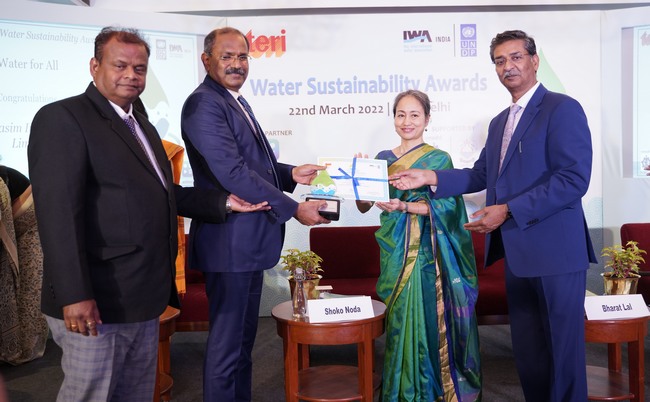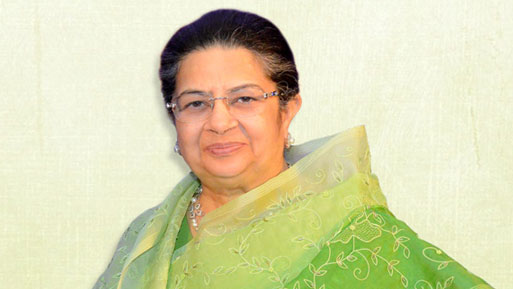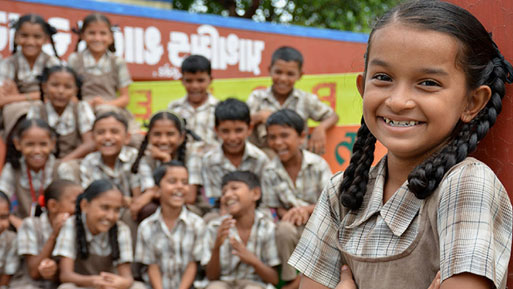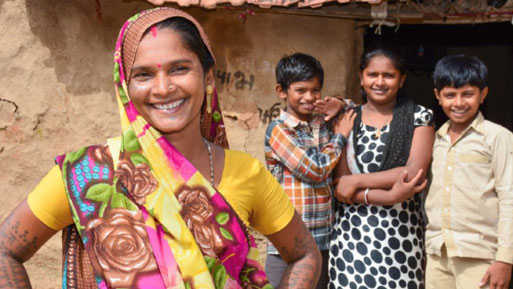Setting new benchmarks for responsible business
13 May, 2022
ShareThe TERI-IWA-UNDP water award for Grasim is a testament to the company’s commitment to sustainability and its CSR-led social transformation of underprivileged communities
With their immense resources and capacity to innovate, businesses play a critical role in tackling the social, economic, and environmental problems confronting our world. By aligning its growth vision to the UN’s Sustainable Development Goals (SDGs) for people and the planet, the Aditya Birla Group (ABG) has made a firm commitment to staying big in the lives of its customers and community partners over the long term.
In yet another recognition of that commitment, Grasim Industries Ltd., the flagship company of the Group, has won an award for its water sustainability practices. Grasim’s SFD Nagda (Madhya Pradesh) unit recently won the first-ever TERI-IWA-UNDP Water Sustainability Award 2021-2022 in the ‘Water for All’ category. The award recognises the far-reaching change Grasim has brought about and its potential to serve as a roadmap for other businesses.
In yet another recognition of that commitment, Grasim Industries Ltd., the flagship company of the Group, has won an award for its water sustainability practices. Grasim’s SFD Nagda (Madhya Pradesh) unit recently won the first-ever TERI-IWA-UNDP Water Sustainability Award 2021-2022 in the ‘Water for All’ category. The award recognises the far-reaching change Grasim has brought about and its potential to serve as a roadmap for other businesses.
However, this feat wasn’t achieved overnight. Grasim has been on a seven-decade-long quest to achieve sustainable growth by transforming underprivileged communities across India.
How Grasim ensures ‘water democracy’ in rural communities
Water is critical for sustenance and sustainable development. Therefore, it is a key focus area for Grasim. To increase the local community’s access to water, the Nagda unit constructed four big dams on the Chambal River and two reservoirs.
These water management efforts enable Grasim Nagda to supply drinking water to nearby towns and villages. Besides Nagda and Khachrod, water is being piped to 22 surrounding villages and also to Ratlam railway station. According to conservative estimates, the project benefits about three lakh people.
The project has had a ripple effect on agricultural productivity in the region too. Land under irrigation has increased, with about 5,148 hectares currently being irrigated. This has helped about 9,000 families to increase their crop production and harvest three crops annually, thus increasing their earnings.
Providing potable water is another area of focus. The plant’s efforts in this respect are currently operational in 55 villages, of which 16 have been selected as model villages. The plant’s management has partnered government agencies to provide piped water to rural households and has constructed tanks for storage of drinking water. Reverse osmosis plants have been set up to provide safe drinking water.
Raising the bar on responsible water usage in operations
In tandem with its community-focused water management efforts, Grasim has taken the lead in reducing the consumption of water at its plants and increased the use of recycled water in its operations.
The amount of water harvested at the VSF Nagda site is more than three times what the company needs for its own use. In addition, Grasim’s Chemical business has successfully implemented a zero liquid discharge policy at the Rehla and Ganjam plants in Jharkhand and Odisha respectively.
The company is also a signatory to the Water, Sanitation and Hygiene (WASH) pledge, and thus is fully committed to its guiding principles. Grasim’s VSF business recorded the lowest specific water consumption in the industry for over 6 years.
Sustainability – a key driver of growth at Grasim and ABG
A deep commitment to communities is integral to Grasim’s operational ethos. In FY20, Grasim invested Rs590 million (2.43% of the company’s net profit for the last three years) on CSR activities vis-à-vis Rs471 million in the preceding year.
Sustainability has been a key driver for Grasim and its CSR activities. The company continues to set new benchmarks in the way it has combined corporate philanthropy and business performance.
Like the rest of the ABG group, Grasim’s CSR activities are channeled through the Aditya Birla Centre for Community Initiatives and Rural Development led by Ms. Rajashree Birla. All activities are guided by ABG’s CSR vision, whose major goals are to build a better, sustainable way of life and raise the country's human development index in line with the UN SDGs.
In all, the ABG Group's CSR footprint straddles 7,000 villages globally. It reaches out to 9 million people annually through its work across key focus areas such as education, healthcare, sustainable livelihood, infrastructure development and women’s empowerment.









